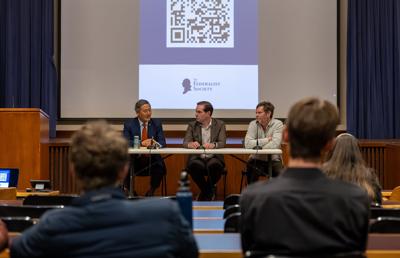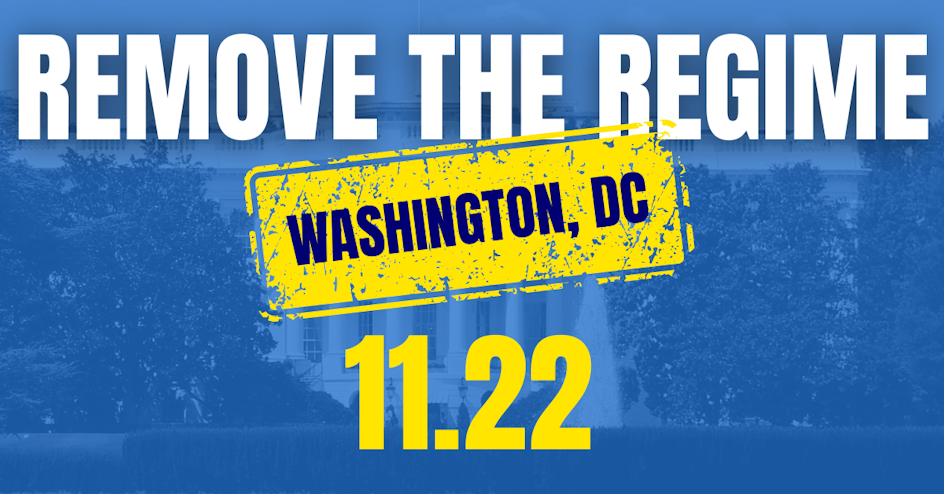- Alice Conry & Ayah Alsheikha | Staff
- Nov 19, 2025 (DailyCal.org)

The Berkeley Federalist Society hosted a panel on Tuesday at the UC Berkeley School of Law titled “Why Israel Won: A Panel on Oct 7th and the Wider War.” The event drew a crowd of roughly 50 people while an equal number of protesters challenged the topic of the panel and the controversial speakers from outside.
Ahead of the event, Berkeley Law sent an email to Berkeley Law Students for Justice in Palestine, or Berkeley LSJP, a campus group that organized the protest. The email threatened to report demonstrators to the state bar if they were found to violate Time, Place, and Manner regulations.
“We planned to host our rally at Heyman Terrace, a space on the perimeter of the law school where we’ve held several unpermitted, impromptu gatherings in the past,” Berkeley LSJP said in a statement. “However, yesterday we received an email from the opaque Building Oversight Committee, warning that since we hadn’t reserved the space, proceeding with the event ‘could’ result in suspended organizational privileges and disciplinary action that would be reported to the State Bar.”
While the panel features three speakers, Berkeley LSJP flyers targeted two speakers, namely John Yoo, a Berkeley Law professor who is infamous for his role in former President George W. Bush’s administration as an author of the “torture memos.”
The memos provided the legal justification for Abu Ghraib — a detention facility used during the Iraq War that led to widespread outrage as the United Nations deemed many of the tactics used to be in violation of international law.
The other notable speaker, Berkeley Law professor Steven Solomon, has been an outspoken critic of campus administration’s response to alleged antisemitism.
In February, Solomon authored an op-ed for the Wall Street Journal titled “Mr. Trump, Investigate My Campus,” after which a joint Department of Education and Department of Justice Taskforce to Combat Anti-Semitism announced an investigation into campus. Solomon is now on the payroll of the federal task force as an adviser on legal issues.
The last speaker, history and public policy professor Daniel Sargent, drew less criticism online as he has not been outspoken on social issues. His research focuses mainly on American foreign policy.
During opening statements before general discussion and audience questions, Sargent identified “four factors” that signified Israel’s victory in the war: institutions, autonomy, persistence and openness.
Solomon discussed the “morality” of Israel’s actions and specifically why the term “genocide” is misused when discussing the country’s military actions in Gaza. Yoo focused on how the war fit into U.S. grand strategy as well as the future implications of the war and its effect on future conflicts in the Middle East.
Regarding Palestine, Sargent said he believes Palestinians deserve rights and dignity, and that “a just peace demands the Palestinian dignity be affirmed.” While Solomon claimed Israel had acted “morally higher” than other nations in a “war like this,” he said he sees people dying in the conflict as a “tragedy.”
During the panel, a group of nearly 50 protesters, led by student group Berkeley LSJP, gathered outside the building around 1 p.m. to denounce Berkeley Law for hosting the event.
The protest remained removed from the building itself as the email from administration warned against violations of Time, Place, and Manner, including the use of amplified sound during the demonstration. A violation of this rule would result in “either (or both) disciplinary action and suspension of the group’s ability to reserve space within the Law School,” according to the email, which was provided to the Daily Cal.
Protesters gathered for less than an hour, chanting “Free Palestine” and taking turns addressing the audience in front of Heyman Terrace.
“I think a lot of faculty and students on this campus are afraid to speak out for justice,” said Brooke Lober, a protester and campus lecturer in gender and women’s studies. Lober earlier condemned Yoo, stating, “It’s unbelievable that he still has an office on this campus.”
Lober claimed that in the past, she was doxxed and received death threats after speaking out for a ceasefire resolution at an Oakland City Council hearing.
“Even someone like me, who’s a lecturer at the school, who doesn’t have security of employment, I feel compelled to use my voice, nonetheless,” Lober said.
The Berkeley Federalist Society, the organizer of the panel, is a conservative and libertarian organization that aims to bring a conservative view to the theory and philosophy of law on campus, according to the group’s president, Shneur Gansburg.
Gansburg said the group was aware the panel would be protested and some of their previous events surrounding Israel had also been protested.He claimed that protesters attempted to pull the fire alarm at the event but it had been shut off.
“We are in an academic environment and I feel like these events should happen and people should be able to hear differences in opinions and thoughts,” Gansburg said.
While protests occurred outside, the proceedings inside remained uninterrupted. A number of police were present both inside and outside of the event. The lack of disruption even prompted Yoo to comment, saying that he was glad he was able to make it to the end of his remarks uninterrupted.
“To Berkeley Law and its Building Oversight Committee (we know you’re reading this!): shame on you,” Berkeley LSJP wrote in the statement. “We will not be cowed by your threats. We broke no rules today, but we adhere to increasingly restrictive and draconian policies only to the extent that doing so advances the struggle for Palestinian liberation.”





